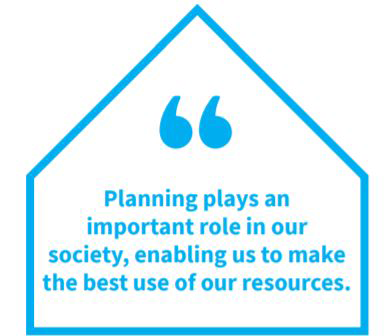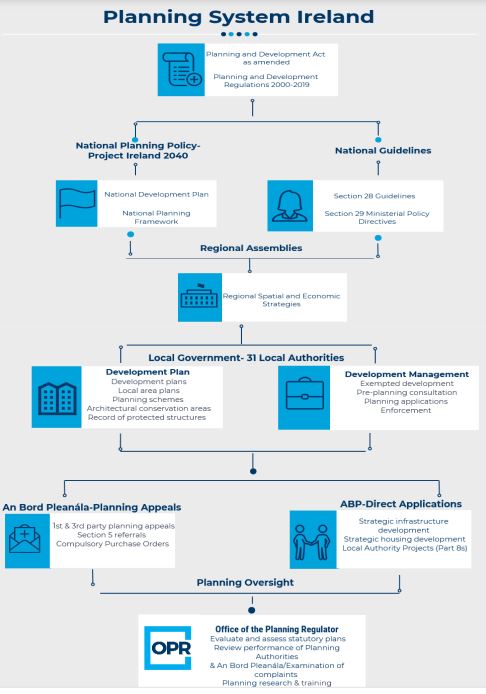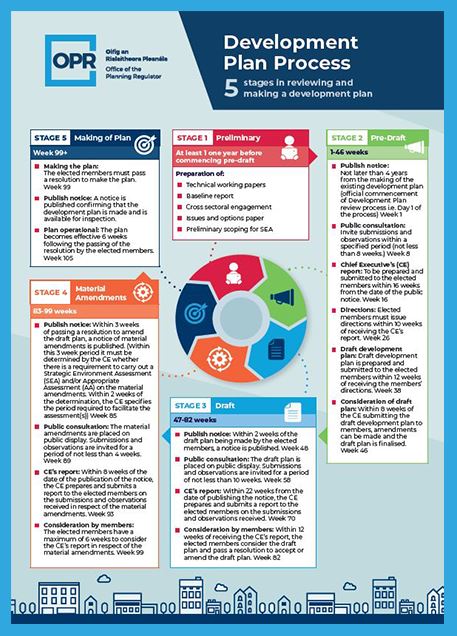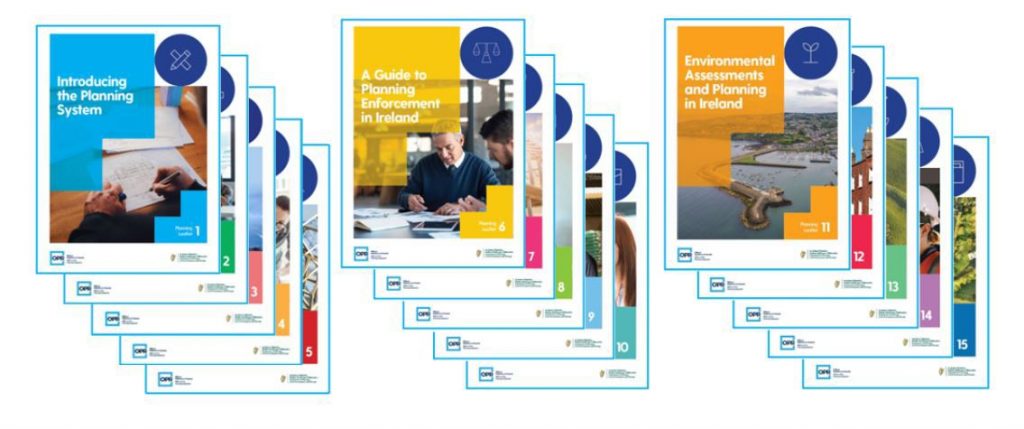Public Awareness
Introduction to Planning
The information that is hosted on this page will provide you with an introduction to the planning system. It is intended to give you an understanding of the role that planning plays in our society and how the planning system works. You can also find out more about the various statutory plans, how they are adopted and the role of the OPR. You can access more information about planning through our planning leaflet series and episodes of the television programme Eco Eye that have a specific planning focus. Links to the leaflets and the Eco Eye programmes are included below. Our FAQ section contains a list of frequently asked questions and this section will be continuously updated.
Please visit the OPR’s Research and Training pages, for further information regarding our research publications and local authority and regional assembly elected members and staff training.
What is planning?
Planning plays an important role in our society. It enables us to make the best use of our resources and allows necessary and worthwhile development to go ahead. It also ensures that the environment and heritage of our towns, cities and countryside is protected. Local authorities (also known as ‘planning authorities’) control the location, amount and type of development by making decisions on planning applications. Everyone has a right to comment on planning matters and to shape the planning and development of their area.
For further information on how to comment on planning matters please refer to our Planning Leaflet Series.

Hierarchy of Plans in Ireland
In 2018, the Government published the National Planning Framework (NPF) as part of Project Ireland 2040. It is the overarching policy and planning framework for Ireland’s:
- Social,
- Economic,
- Environmental, and
- Cultural development.
The NPF replaced the National Spatial Strategy as Ireland’s planning framework. The policies in the NPF must be taken into account when preparing Regional Spatial and Economic Strategies and development plans.
Regional Spatial and Economic Strategies (RSES) have replaced the Regional Planning Guidelines. The objective of each Regional Spatial and Economic Strategy is to support the NPF and the economic policies and objectives of the government. Each strategy is a long-term planning and economic framework for the development of each region. Ireland is split into three strategic planning areas:
- Eastern and Midland Region,
- Southern Region, and
- Northern and Western Region.
These regions are governed by regional assemblies. Regional assemblies consist of members of the local authorities within the region. The regional assembly adopts the Regional Spatial and Economic Strategy.
The development plan is the main public statement of planning policies for your local community. It sets out the land use, amenity and development objectives and policies of the planning authority, for a six-year period. The plan consists of a written statement of objectives and includes maps that give a graphic representation of how your city/county will develop and improve in a sustainable way in the six-year period. The core strategy of the plan shows that the plan is consistent with the National (NPF) and Regional (RSES) policies.
Elected members (councillors) are responsible for making, reviewing and varying the development plan. It is their duty to adopt the plan with the technical help of their officials (the chief executive, planners, etc.). Public consultation on the plan must also be carried out.
A local area plan provides more detailed planning policies for areas where significant development and change is anticipated. A local area plan must be compatible with national and regional guidance documents and the core strategy and policies of the development plan. A local area plan is valid for six years from the date it is adopted by the planning authority.
Why is planning important?
Planning ensures that the right development happens in the right place at the right time, benefitting communities and the economy. It plays a critical role in identifying what development is needed and where. It helps to decide what areas need to be protected or enhanced and assesses the suitability of proposed development.
What are the main features of the planning system?
The main features of the planning system are:
- making development plans,
- the need for planning permission,
- exempted development (i.e. minor works where planning permission is not required),
- appeals against planning decisions, and
- planning enforcement.
What is a development plan?
A development plan is the main public statement of planning policies for your local community. It sets out the land use, amenity and development objectives and policies of the planning authority, for a six-year period. The plan consists of a written statement of objectives and includes maps that give a graphic representation of how your city/county will develop and improve in a sustainable way in the six-year period. The core strategy of the plan shows that the plan is consistent with the National (NPF) and Regional (RSES) policies. Elected members (councillors) are responsible for making, reviewing and varying the development plan. It is their duty to adopt the plan with the technical help of their officials (the chief executive, planners, etc.). Public consultation on the plan must also be carried out.
The five key stages involved in making and reviewing a development plan are set out in the accompanying infographic.
Elected members are responsible for making or varying a development plan. To read more about the role of elected members please visit ‘The Role of Elected Members in Planning’ page.
What is the role of the OPR?
The Office of the Planning Regulator (OPR) was established in April 2019 on foot of recommendations made by the Tribunal of Inquiry into Certain Planning Matters and Payments (the Mahon Tribunal). Our role is to ensure that local authorities and An Bord Pleanála support and implement Government planning policy.
We also conduct planning research, deliver planning training events and promote public awareness of planning in order to encourage the public’s engagement in the planning process and to enhance knowledge and public information about planning in Ireland.
These videos were prepared to provide more information about the OPR’s role and the work carried out by the various teams in the organisation please take a few minutes to watch them:




Planning Leaflets
The OPR and the Department of Housing, Local Government and Heritage published a series of planning leaflets, in early 2021, dealing with all aspects of the planning system. These leaflets were revised and updated in 2022 and cover a wide range of issues including how to prepare and lodge a planning application, how to make a planning appeal, requirements for change of use, building extensions, garages, domestic sheds, agricultural development, etc. A full list of the planning leaflets is available here. The leaflets can be accessed free of charge by clicking on the cover images opposite. They are also available from your local planning authority. The leaflets will be updated on a regular basis to take account of changes in legislation and policy.
Eco Eye Episodes
The OPR has collaborated with the producers of Eco Eye, Ireland’s longest running environmental television series, on a number of episodes dealing with the theme of sustainable spatial planning. Two episodes of particular interest ‘A Place for Home’ and ‘Planning Matters: Boyle Town’ can be viewed by clicking the images opposite. These episodes focus on the importance of sustainable growth and why good spatial planning matters. To view further Eco Eye episodes dealing with sustainable spatial planning please visit our Media Library.
Frequently Asked Questions
Generally, you need planning permission for any development of land or property unless the development is specifically exempted. Development includes, carrying out work (building, demolition, alteration) on, in, over or under land or buildings and making a material (i.e. significant) change of use of land or buildings. Failure to obtain planning permission where it is required can result in penalties (e.g. significant fines and/or even imprisonment). Your local planning authority will be able to advise you about this.
You must lodge an application for planning permission with the planning authority for your area, which is one of the 31 local authorities in Ireland (your local city or county council). Application forms and information are available from your local planning authority. For more information, see planning leaflet 4 – ‘A Guide to Making a Planning Application’.
You may consult with the planning authority before lodging a planning application. It is often a good idea to do this, especially if you are unsure of local planning policies or if your proposal is complex.
You have a right to make a written submission or observation on any planning application on payment of the appropriate fee. The submission or observation must be made in writing within five weeks of the date that the planning authority receives the application. If possible, you should quote the planning application reference number. You must give your name and indicate the address to which any correspondence relating to the application should be sent. Your submission or observation will be acknowledged by the planning authority and you will be notified of the decision.
Your submission/observation must be based on planning considerations, not on personal likes, dislikes or grievances. Planning considerations include:
- national, regional plans and Government, Ministerial directives,
- development plan objectives and policies,
- local area plan objectives and policies,
- development management considerations such as density, parking provision, traffic hazards,
overlooking, effects on residential amenities or services, - environmental, amenity and shopping impacts,
- public health, and
- other planning matters.
If you have made a submission or observation that the planning authority has acknowledged, you
have the right to appeal its decision to An Bord Pleanála.
The planning authority considers several matters when deciding on a planning application including:
- the proper planning and sustainable development of the area (e.g. appropriate land
use (zoning), road safety, development density, size, location, adherence to
established planning and development practices); - provisions of the development plan;
- any other relevant plans (e.g. local area plan);
- Government or Ministerial policy;
- the provision of a Special Amenity Area Order relating to the area;
- the types of conditions that can be attached; and
- any European site (e.g. Special Areas of Conservation; Special Protection Areas).
Any person applying for planning permission, or who made written submissions or observations to the planning authority on a planning application, can appeal a decision made by a planning authority to An Bord Pleanála. For more information, see planning leaflet 5 – ‘A Guide to Making a Planning Appeal’.
Any development that requires planning permission or a development which is in breach of the conditions of its planning permission is classed as ‘unauthorised development’. The term ‘development’ covers a wide range of activities including carrying out any works (i.e. building, demolition, alteration) on, in, over or under any land or buildings and making a material (i.e. significant) change of use of structures or land. For more information, see planning leaflet 6 – ‘A Guide to Planning Enforcement in Ireland’.
Carrying out unauthorised development is an offence and anyone who has undertaken unauthorised development may be subject to enforcement proceedings. Enforcement action can only be taken when development has been undertaken without the appropriate planning permission.
If you think that someone is developing or using land without, or contrary to planning permission, the first step is to contact the planning authority. When doing this you need to set out in writing why you believe this is the case. When reporting a suspected breach of planning control, it is helpful if you provide as much information as possible including:
- the exact address,
- dates and/or times when activities started,
- the nature of the building works or use, and
- the names, addresses and contact details of the known owners or other persons responsible.
For more information, see planning leaflet 6 – ‘A Guide to Planning Enforcement in Ireland’.
The OPR was established in April 2019 on foot of recommendations made by the Tribunal of Inquiry
into Certain Planning Matters and Payments (the Mahon Tribunal).
In establishing the OPR, the Government’s aim is to enhance proper oversight of the planning
system and to promote quality outcomes from, and consistency within, the planning system. The
role and functions of the OPR are set out in the Planning and Development (Amendment) Act 2018
and include:
- the assessment of local authority county/city development plans and local area plans, and
regional assembly regional spatial and economic strategies to ensure consistency with
relevant regional or national policies and the requirements of planning legislation and good
planning practice; - the review of the systems and procedures used by any planning authority, including An Bord
Pleanála, in the performance of their planning functions; and - driving national research activities as well as education, training and public awareness
programmes to support the application of best practice in planning functions and activities.
Further information in relation to the role of the OPR is available here.
To download a copy of the FAQs please click here.



